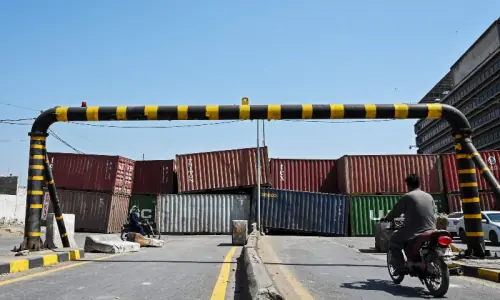A NEW World Economic Forum report has termed Pakistan’s debt crisis as the top risk facing the country. The profligacy of the country’s ruling elite — politicians, civil and military bureaucracy and the business community — has brought the country to a stage where we have to borrow more money to not only run the state but also to pay back the past debt.
The country’s debt comprises two parts — domestic loans and foreign borrowings. In simple words, domestic loans signify accumulation of fiscal or budget deficit, or the gap between what we collect in taxes and what we must spend to keep the state afloat and the economy running. Foreign debt is accumulation of current account deficit, or the shortfall in the amount of dollars we earn through exports, remittances, FDI, etc and spend on imports, essential and luxury both.
Over time, the growing deficits accrued in the fiscal and external accounts have become unsustainable, undermining the nation’s sovereignty. The government conceding to IMF demands to grant absolute autonomy to the SBP and impose new taxes that will hurt the low-middle-income households the most is the latest example of the gradual loss of sovereignty to lenders. The rising debt levels have also constricted Pakistan’s ability to grow the economy at a pace needed to create new jobs for 3m people entering the job market each year and cut abject poverty.
A recent World Bank forecast says the country’s economy is likely to expand by 3.4pc this fiscal, much slower than the government’s target of 4-5pc and at half the rate required to absorb new labour market entrants. No sooner the government tries to push growth, the economy hits external imbalances, compelling it to return to the IMF for help.
Read more: Will have to approach IMF again if no rise in exports: PM Imran
Successive governments have tried to control accumulation of debt stock by cutting public spending on social and economic infrastructure at the cost of health, education and growth and/or taxing the already taxed segments of the economy. Obviously, such schemes don’t work as is reflected by consistent breach of the Fiscal Responsibility and Debt Limitation Act 2005 that sought to cap total public (domestic and foreign) debt at 60pc of GDP. Currently, the ratio stands at around 80pc of GDP.
The SBP governor told Reuters the other day that the “country has the capacity and financial cushion to ride out rising external account pressures being driven by a surge in global commodity prices”. We will do so indeed with the IMF and other multilaterals backing us with their dollars. But is this a sustainable solution? The only way forward for the country is to broaden its tax net and control non-productive civil and military government expenditure.
Simultaneously, we must increase productivity to boost exports and curtail non-essential imports. In other words, we will have to change our lifestyle and learn to live within our means if the ballooning debt crisis is to be tackled.
Published in Dawn, January 13th, 2022






























